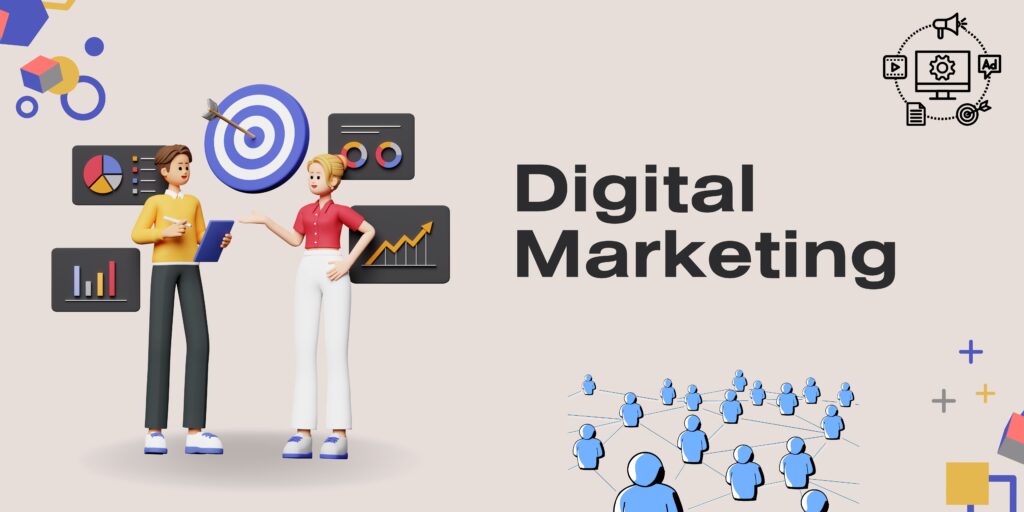What is Digital Marketing and Why is it Important?
Digital Marketing: Your Guide on Road to Success Today’s connected world forces companies to find digital marketing ways for them to engage their targeted customers and contribute to its growth. However, exactly what is this kind of marketing and how significant it is for people living in the 21st century? What Is Digital Marketing? Digital marketing is the promotion of products or brands via electronic channels. Its channels may include search engines, social media, email, and mobile apps. Essentially, it’s the practice of leveraging digital technologies to connect with your target audience. Why is Digital Marketing Important? Digital marketing offers a multitude of benefits that can significantly impact your business’s success. Here’s why it’s so important: * Global Reach: Borderless Marketing: The internet doesn’t have borders. With digital marketing, you can access the entire globe, therefore, increasing your market and customers. Targeted Marketing: Using the digital tools, you are able to reach specific demographics, interests, and behaviors that will help your message to reach the right people. * Cost-Effective: Lower Overhead Costs: Compared to offline marketing techniques, online marketing typically involves much less overhead cost. You can start small and incrementally scale up your efforts based on what you can afford. Measurable Results: Digital marketing provides useful insights into your campaigns’ performance. You can track key metrics like website traffic, engagement rates, and conversions, allowing you to optimize your strategy and maximize your return on investment (ROI). * Customer Engagement: Interactive Platforms: Digital marketing allows for two-way communication with your audience. Social media, email marketing, and online forums offer opportunities to interact with customers, answer their questions, and build strong relationships. Personalised Experiences: With the help of customer data, you can tailor your marketing messages to individual preferences, creating more relevant and impactful campaigns. * Brand Awareness and Reputation Management: Increased Visibility: Search engine optimization (SEO) and pay-per-click (PPC) advertising can make your website rank higher in search results, making it easier for potential customers to find you. Online Reputation Control: Monitoring and managing your brand’s online reputation is important. Digital marketing allows you to address negative feedback, respond to reviews, and maintain a positive image. * Data-Driven Decision Making: Actionable Insights: Digital marketing tools give you the valuable data you need to make informed business decisions. By analysing website traffic, customer behaviour, and campaign performance, you can make data-driven adjustments to your strategy. Key Components of Digital Marketing To implement a digital marketing strategy effectively, you must understand its core components: Search Engine Optimization (SEO): Organic Search: SEO focuses on optimising your website to rank higher in organic search results. Keyword Research: Identify relevant keywords to target your audience’s search queries. On-Page Optimisation: Optimise your website’s content, titles, meta descriptions, and headings. Off-Page Optimisation: Build high-quality backlinks to your website from other reputable websites. Pay-Per-Click (PPC) Advertising: Paid Search: PPC advertising enables you to bid on keywords, and your ads will appear on the search engine results page. Pay-Per-Click Ads: Develop creative ad copy and landing pages that capture people’s attention and lead them to conversion. Content Marketing: High-Quality Content: Create valuable, informative, engaging content, such as blog posts, articles, videos, and infographics. Content Distribution: Share your content on social media, email newsletters, and other relevant channels. Social Media Marketing: Social Media Channels: Use Facebook, Instagram, Twitter, LinkedIn, and TikTok, among others, to communicate with your audience. Social Media Plan: Develop a consistent social media presence, share interesting stuff, and engage with the followers. Email Campaigns: Build and nurture your email list by sending targeted email campaigns. Personalised Emails: Tailor your email content to the interests and preferences of your subscribers. Mobile Marketing: Mobile-Friendly Websites: Ensure your website is optimized for mobile devices. Mobile Apps: Develop mobile apps to enhance customer engagement and loyalty. The Future of Digital Marketing As technology advances, so does the horizon of digital marketing. Some key trends to watch out for are: * Artificial Intelligence (AI): AI tool can automate tasks, personalise marketing campaigns, and improve customer experiences. Voice Search: Optimise the content for voice search queries to capture the ever-increasing internet user segment. * AR and VR: The new wave of immersive technologies could present unique and engaging brand experiences. * Data Privacy and Security: With tightened regulations on data privacy, data protection and ethical marketing is the needs of an hour. By embracing digital marketing and keeping pace with emerging trends, you position your business for long-term success in the digital age.
